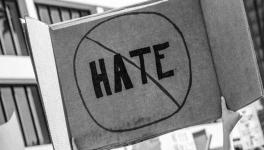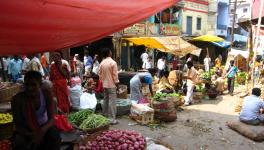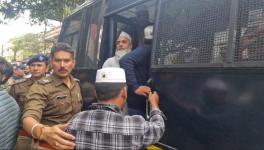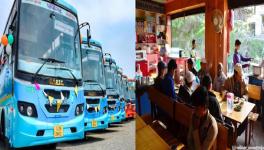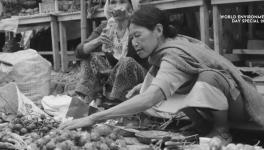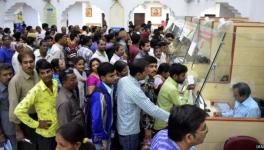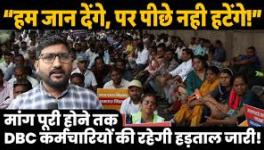Empathy is Greater Than Hate: Muslims Engage in Relief Work
Representational Image.
During the ongoing Covid-19 pandemic, Muslims in India have come to be hyper visibilised as ‘carriers’ of the virus. The hate campaign around the Tablighi Jamaat episode rendered the active engagement of Muslims in the relief work invisible. It is not for the first time that the voices, experiences and stories of Muslims have been drowned out by a loud, aggressive alternative narrative to suit the majoritarian opinion.
Yet again, while countries across the globe are constructing strategies to fight the pandemic, in India the hostility against Muslims continues—leaving them oscillating between visibilisation as the demonic ‘other’ and invisibilisation of their acts of charity and responsible citizenship.
Be it on the frontline as doctors or as volunteers engaging in relief work armed with empathy, in numerous instances Muslims across the world have stood in solidarity with the disadvantaged fellow human beings in the unforeseen circumstances shaped by the deadly Novel Coronavirus. In India, several non-governmental organisations founded by Muslims have set up charities to provide dry rations, cooked meals, counselling and support to the people in need.
On 25 March, a day after the 21-day lockdown was announced in the country, Yusra, a social worker, and her team, sat to pack a “Covid-19 safety net” for the underprivileged in Southeast Delhi. This kit carried a few food essentials, basic sanitary requisites, masks and gloves for the most vulnerable people to survive the three weeks period. Over the next few days, Yusra and her team visited houses in Jasola, Nizamuddin, Madanpur Khadar, and Khajuri Khas to ensure doorstep delivery of these kits. Over a fortnight, they reached out to 250 families with the first aid.
Meanwhile, several WhatsApp groups have also been created, which members of different organisations run by Muslim youth have joined, to forge affective alliances and coordinate the relief work being carried out initially in different parts of Delhi NCR. Social media mobilisation by them include crowd-funding campaigns, and flyers posted across different platforms, calling out to society to participate in relief work, invoking the obligation to give in charity.
Masjids across cities have become centers of dry ration collection drives, for making announcements regarding measures to prevent the spread of the deadly virus, and for feeding cooked meals to the poor. Further, Muezzins and Imams of mosques in West Bengal have donated Rs 1 crore to the Chief Minister’s relief fund.
How did their enthusiastic acts of solidarity in dealing with the Covid-19 crisis get completely wiped out and the entire community was alleged by mainstream electronic and print news media to be waging “corona jihad” and held solely responsible for the spread of the virus in India?
The discourse in the national media has been dominated by the irresponsible behavior of the Tablighi Jamaat, where every suspected case in the country has been associated with the Nizamuddin Markaz. The revolting vocabulary used to label Muslims as ‘terrorists’, ‘jaahil’ and ‘enemies’ of the nation by the Indian media. Rapid sharing of fake news across WhatsApp and the drawing of Islamophobic caricatures have once again weaved together a narrative to stigmatise them. The consequence of this has been a spike in incidents of abuse and violence against Muslims across the country.
A Muslim family of five engaged in distribution of relief material in Bengaluru was beaten, allegedly by Hindutva activists who accused them of poisoning rations. The Hindu majoritarian narrative vilifies Muslims to such an extent that even their efforts made in compassion, communitarian spirit and empathetic engagement are projected through Islamophobic references.
However, despite the raging Islamophobia, and physical and psychological threats, Muslims have continued to support people in distress, dismantling the stereotypes. SOS messages continue to pop in on the numerous WhatsApp groups created for the coordination of relief work. While mapping the resources available, Muslim social workers are empowering the youth within different clusters to take up the responsibility to not only cater to the prevailing hunger situation but also in preparing their communities to adopt preventative measures.
At the heart of Islam is the call for an active engagement in acts of charity and to be of service to the fellow humans. Muslims have embraced this call and set out on a seal to protect the rights of people to food, life and dignity. They have reciprocated hate with empathetic acts. Collectively, they are displaying that even when society is overburdened with pain, grief, hunger, loss of livelihoods, isolation and anxiety, the least society can encompass is not to also foster a crisis of empathy.
Amreen, co-founder of an NGO based in South Delhi, describes her restlessness and recurring thoughts of hunger killing more people than Covid-19, the disesase caused by the Novel Coronavirus. She has been stepping out with a curfew pass to conduct relief efforts.
Further, with the extended lockdown, and the approach of the month of Ramadan, these Muslims and organisations engaged in relief work feel a higher responsibility to sustain their efforts and assist many more families and communities in need.
All this while, the majoritarian forces have continued to dehumanise the Muslims. For the thousands of people whose needs are being responded to, these Muslim volunteers shall be remembered as empathetic frontliners in the fight against the pandemic.
The author is a PhD candidate at Department of Social Work, Jamia Millia Islamia. The views are personal.
Get the latest reports & analysis with people's perspective on Protests, movements & deep analytical videos, discussions of the current affairs in your Telegram app. Subscribe to NewsClick's Telegram channel & get Real-Time updates on stories, as they get published on our website.










